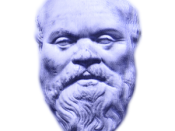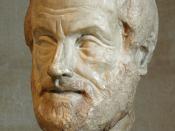a-What are the main ideas of the cosmological arguments for the existence of God?:
This essay will address the main issues of the cosmological argumeants in ways of proving the existence of God and will then comment of the weaknesses of these argumeants. The cosmological argumeants all seek to prove the existence of God through the main idea that causation of the universe leads back to God; everything that exists has a cause, the universe exists therefore it has a cause, this cause is God, therefore God exists. The Cosmological argumeant is a posterirori as it uses observation and experience of the accsessable world, as well as inductive which means that it moves from the observable knowledge to assume what is unknown. In this case the cosmological argumeant observes causation (chains of reactions) in the universe and then applies this to the universe as a whole to seek to prove that God is the ultimate cause.
Plato (428-348 BCE) and Aristotle (390-323 BCE) both recgonised that God was part of the chain of causes and reactions. Plato labelled him and the primary mover whom moves and changes itself and others weras Aristotle saw him as an unmoved move who is the ultimate cause of the universe. In both cases it was thought that every part of the universe had causes which regressed back to God. In a simplified way it can be seen as- a book from paper, paper from a tree, tree is nature, God creatred nature and therefore the ultimate cause of the book is God. Aristotle went further to add that it is nonsence to say that the chain of reaction, cause and effects has no beginning as nothing expect the unmoved mover (or God) is self actulising.
Aquinas's) three ways (13th century) are part of the...


